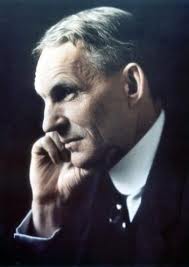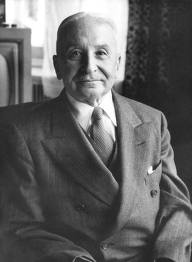An idea is not necessarily good because it is old, or necessarily bad because it is new, but if an old idea works, then the weight of the evidence is all in its favour. Ideas are themselves extraordinarily valuable but an idea is just an idea. Almost anyone can think up an idea. The thing that counts is developing it into a practical product. ~Henry Ford, My life and work, 19
I think Henry Ford has a point. What separates the theorist from the scientist, or the dreamer from the entrepreneur, is action. For the scientist, experimentation is the necessary step after the formulation of the hypothesis. Similarly, for the entrepreneur, the “foot-work” must come after the vision if the business is to grow. Simply put, thought precedes action and, according to Ford, thought is nothing without action.
 There is no question that Mr. Ford was a man of action. He was a scientist and an engineer, an entrepreneur and an inventor, and especially a spokesperson for both the businessman and the common-man. The founder of Ford Motor Company, he manufactured millions of cars for the American people.
There is no question that Mr. Ford was a man of action. He was a scientist and an engineer, an entrepreneur and an inventor, and especially a spokesperson for both the businessman and the common-man. The founder of Ford Motor Company, he manufactured millions of cars for the American people.
But most importantly, Mr. Ford was a free-thinking man. He was an individualist; one who believed in the dignity of the hard work and the sanctity of property.
Conversely, he despised unnecessary governmental interference----whether it came from the Bolshevists in Soviet Russia or the “masters” in Washington. To him, government was always promising things it could not deliver on:
When you get a whole country---as did ours---thinking that Washington is a sort of heaven and behind its clouds dwell omniscience and omnipotence, you are educating that country into a dependent state of mind which augurs ill for the future. Our help does not come from Washington, but from ourselves; our help may, however, go to Washington as a sort of central distribution point where all our efforts are coordinated for the general good. We may help the government; the government cannot help us.
But today all our government wants to do is “help” us. It wants to make us “safer,” so it passes endless amounts of federal regulation and code for us to abide by. It wants to “take care of us” so it taxes the productive and gives to the unproductive. It wants to “protect industry” so licenses certain business or demands a fee from those that want to enter into a new line of work. It taxes us for our income and our consumption; it modifies our contracts and our agreements.
Simply put, our government gets in the way of our work. And for those of us who want to follow in the footsteps of Mr. Ford, we are discouraged from doing so because the stakes---and the costs--- of doing business are so high.
All thanks to our “caring” government.
But what motivates man to action?
 Ludwig von Mises, one of the greatest economists of the 20th Century, stated that man acts---and acts “purposefully”---because he aims to manifest his will. Action demonstrates preferences---
Ludwig von Mises, one of the greatest economists of the 20th Century, stated that man acts---and acts “purposefully”---because he aims to manifest his will. Action demonstrates preferences---
But before man acts, he must determine what his action will “cost” him. According to economic theory, it is called a cost-benefit analysis. If the benefits outweigh the costs, the acting person will act. All benefits and costs are subjective to the acting person, however, and therefore not all action can be predicted from an outside perspective.
For example, because time and energy and physical resources are scarce, each person must decide on how best to use said time or energy or resources in the manner most satisfying and agreeable to that person.
If it is his wish that he not be rained on, he must build a cover over his head. If it is desire that he learn more about the stars, he must study them. If it is his objective to become wealthy, he must serve:
To prohibit a great people…from making all that they can of every part of their own produce, or from employing their [capital] and industry in the way that they judge most advantageous to themselves, is a manifest violation of the most sacred rights of mankind. ~Adam Smith, The Wealth of Nations, 1776.
At first read, Smith’s words seem so obvious that they barely register as thought-provoking. But upon further reflection, Smith’s words prove to be a powerful, thought-provoking statement that challenges the current times.
Smith is describing not only the sanctity of private property, but the logical extension that private property infers onto the acting individual---the right to do with your property as you see fit.
Gabriel Mueller is a former economics teacher. He has a background in law and justice studies, is a self-taught Austrian economist, political activist, and a huge Ron Paul supporter. Gabriel works at Liberty Coin & Precious Metals in Scottsdale, AZ


